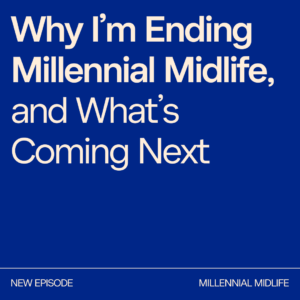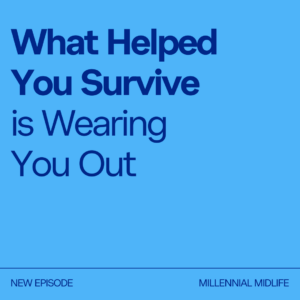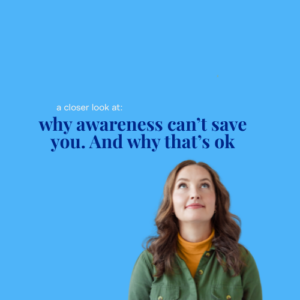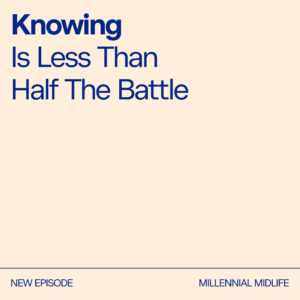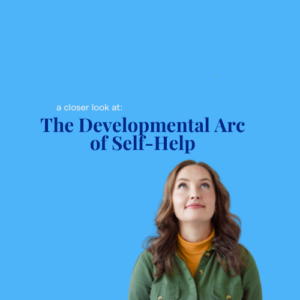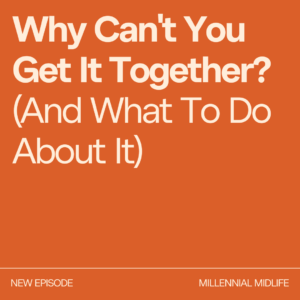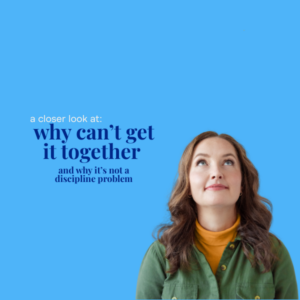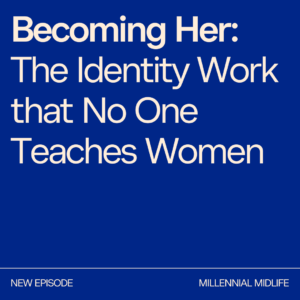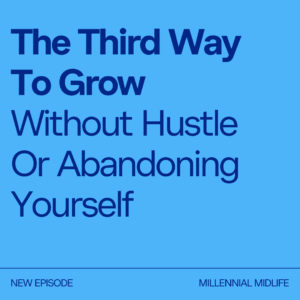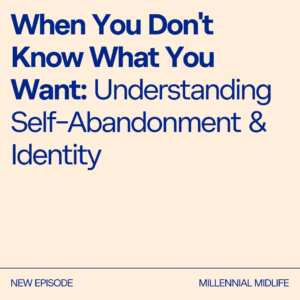Cecelia Baum Mandryk (00:01.25)
Hey, and welcome to Calmer Conversations. I’m Cecilia. Today we’re going to talk about how feeling an emotion does not make you that kind of person. So feeling angry does not make you an angry person. And this is sort of a reminder and a reframing. And it comes up periodically in my group coaching. So I thought you might appreciate it too. First, before we get started, let’s do a little bit of grounding, a little bit of centering, just one minute, right? This is a one minute gift that you’re giving your nervous system. And really all you need to do right now
is bring your awareness and your attention back into this present moment. If you’re driving, you might notice your sits bone on the seat, the feel of the steering wheel underneath your hands. If you’re sitting somewhere, you might notice your feet on the ground. You might notice whatever it is that’s supporting you. You might soften your gaze or at least bring it a little bit more inward, even close your eyes if it’s possible for you and safe for you to do right now.
and take a few intentional breaths. You might even make a sire sound for the exhale first and then move to breathing in and out through your nose and see if you can soften your breath a little bit or if you can extend the exhale just a little bit.
And as you do this, you might remind yourself you’re safe in this moment, that you have everything that you need, that in fact you are okay right now. Even if you’re uncomfortable, even if circumstances aren’t how you’d like them to be.
You might recognize that with each breath, you’re getting what you need.
Cecelia Baum Mandryk (01:34.606)
Okay, let’s get started. I used to fall into this trap and I’m guessing some of you do because again, this comes up in individual coaching, but also group coaching pretty periodically and with some regularity. So we have, when you were a kid, you probably did something or said things and people labeled you as the emotion, right? So you expressed anger and people labeled you as an angry person.
This doesn’t extend just to emotion. So for instance, you spill something and people call you a klutz or you are resting on the couch and somebody calls you lazy or you hear somebody else called lazy because they’re resting or taking time for themselves. You are not your emotions. You are human. And part of the human experience is actually experiencing the full range of emotions. That means
of the quote unquote good ones. I don’t know if you’ve seen an emotional wheel. If you have not seen one, please Google that right now or ask AI to give you one and look at them and look at all the different emotions and know that every single emotion that’s on that wheel is part of your human experience. And at some point, either within one day or one week or one lifetime, you will certainly experience everything on that wheel. And that when you feel one certain emotion, that does not make you that kind of person.
And let’s play around with this a little bit because very often people have them around things like annoyed, like I’m an annoyed person or I’m irritated all the time or I’m an angry person. It’s very rare that somebody gets it the other way. Like I can think of a couple people, right, where they’re really joyful and they express joy a lot and somebody calls them a joyful person. But very often if you’re expressing love, people don’t then like start spiraling about like, now I’m going to become such a loving person, right? They’re not.
They don’t feel that way. We don’t use our emotions as evidenced against ourselves in the positive realm in the same way that we use them against ourselves in this kind of quote unquote bad negative realm. And that’s actually what we’re doing. You are having an experience as all humans have experiences and you’re using it as evidence against yourself that you are a certain way. You’re condemning yourself because you’re having an emotional experience. And I’m going to shift this a little bit.
Cecelia Baum Mandryk (03:51.724)
Right? So we already talked about how these emotions are perhaps part of the human experience and you will experience them on any given day, on any given part of your life, maybe repeatedly over and over again. But they are not evidence that you are a certain way. So you as a person experience emotions. What is an emotion? An emotion is an energetic and chemical signature that happens in your body. Right? You might even pick the an emotion.
any emotion really, but you can pick the one that you’ve kind of labeled yourself as if you’re somebody who’s afraid of being angry or being an angry person. You might notice what it feels like in your body and you might notice that this emotion actually comes and goes. And in fact, emotions usually come in waves and the wave, if we don’t resist it, lasts about 60 to 90 seconds. So this emotion that you’re feeling, even if you’re in the habit of feeling it quite frequently or you’re afraid of feeling it, it’s a very short term part of your day.
That’s not to say that you can’t experience many waves of anger, right? But we experience these things and it is not the emotion that makes us something. It’s the fact that we latch onto it. tell a story about it. So the fact is that maybe you feel something like butterflies in your stomach. This came up. What is a butterfly in your stomach? How does it feel? The fact is, okay, it feels like there’s a tingling in my abdomen.
and it feels like my pulse is quickening. Those are the facts. The story is, this means I’m nervous. This means I’m not going to be able to speak well if I’m asked to speak in public. This means that I am uncomfortable. And maybe I’m gonna make it mean I’m a bad public speaker, or maybe I’m gonna make it mean that I always get nervous in social situations. And then we take that story and we kind of double down on it. Sometimes we shame Spiral about it.
But we then take the story and we make it mean something about us, right? It means this that I’m experiencing these little tingles in my tummy every time I’m around other people. Every time I feel this flush of hotness on my cheeks and I feel this like explosion feeling in my chest, it means I am an angry person. Not that I’m experiencing this set of physical sensations, this chemical experience within my body at this point in time. And
Cecelia Baum Mandryk (06:15.422)
The thing is, when we double down on the story, that’s actually when we kind of start to, we start to enforce these stories and we start to actually become that kind of thing, right? Not because we are an angry person, not because that’s inherent in your personality, but because when you start to claim that you’re an angry person, you actually exhibit more of those signs, right? You have gone down the path of kind of claiming that.
and now it’s yours and it will show up more often. So it’s kind of like if you listen to my dump truck episode, when I expect to see dump trucks, I see more dump trucks, right? And so many of you have written in.
Cecelia Baum Mandryk (06:55.596)
Sorry, I got a call from the DMV. I wanted to answer it so I didn’t miss it and have to wait for a long time again. So I’m gonna see if I can step back into where I was. Okay, so it is when you start to double down on calling yourself something that you actually become more of it. So really emotions, to take this back to the emotions, are these energetic signatures within our body, right? They are things that we all…
have within our lifetime. And we get to decide what we make them mean. And when you can stop making having a certain emotion mean something like, the day is ruined because I just got angry because my kid threw my toothbrush in the toilet. Instead of making it mean that I’m an angry person or my day is ruined, we can just step back and we can be with a sensation of anger. And then from that place, we can ask, how do I want to move forward?
So this is a very different way than experiencing the anger, than shame spiraling about it and saying I’m an angry person or this means something bad about me. The fact that I’m experiencing anger means that I’m an angry person versus the fact that I’m experiencing anger means that am a human, experiencing a human emotion that I am now calling anger, a set of physical sensations that I’m calling anger. And from that place of this being a human, I get to choose what I make it mean.
I don’t have to make it mean something really specific about me or that everything’s going to go wrong or that I am this way. And in fact is when we can start to detach ourselves from the meaning that we start to be able to be with the emotions on a whole different way. And this is, I talk a lot about how processing your emotions is a superpower.
So being able to recognize and process your emotions without making them mean something bad about you is really life-changing because all of a sudden you will get a wave of some kind of emotion because some thought crossed your mind because you saw something. You can process the emotion within you. And then from a seat of groundedness and confidence and integrity, really the integrity, right? This grounded integrity that we can have, you can ask, what do I want to do with this?
Cecelia Baum Mandryk (09:04.748)
What story do I want to tell? Because the story that you picked up on either subconsciously or really intentionally as a kid that somebody told you is like angry people. If you are angry, you are an angry person. If you express any anger, you can start to detach from that story and create a new story of your own liking. But the first part is you have to recognize the emotion and you have to recognize your current story and ask yourself if you can change it if you’re open to changing it. So.
If there is a place where you feel stuck, is it a place where you feel like, I don’t know, you’re afraid of an emotion or it feels really big for you or it feels like you’re just in this pattern, because you are in a pattern, right? You’re in a pattern that your subconscious knows. It tries to repeat those. It tries to create familiarity through repetition by, you know, it’s trying to kind of control or contrive your experience in life by creating the same experience over and over again. And a lot of this happens through emotions. And so even
knowing that and recognizing the emotions that come up, all of a sudden you can say, this is anger. No big deal. It doesn’t make me an angry person. Anger feels like this right now. And you can drop into the physical experience of anger. And then you can even say, if this wasn’t a condemnation of it, if this wasn’t one more piece of evidence that I’m an angry person, if I could choose what I wanted to with how this, what this means for me, what would I do? And then from there you can go forward.
This changes how you relate to emotions. And emotions all of sudden then aren’t these like scary things that mean something bad about you. They’re just part of your everyday experience. And you’ll continue to feel them because again, you’re human. And if you’re listening to this, you’re probably not sitting alone somewhere in a cave meditating. You’re probably living in the world with other humans and you’re going to keep feeling human emotions. And while you might think that you want to escape from the emotional experience of being a human, I promise that you do not. You want to live this life. You want to actually feel the emotions and maybe you’re even here to feel.
the wide range of emotions. And as soon as you stop making them mean something bad about you, then they just become part of the landscape of your everyday life. And if you think about physical landscapes, most of them, there’s so many different beautiful and interesting ones, right? And it’s only when we judge them as good or bad that they become good or bad. Before that, they’re just a landscape, just an emotion, just things in your body. And you can handle them, I promise. They’re not dangerous. You’re okay. All right, try this out.
Cecelia Baum Mandryk (11:27.968)
see what it’s like to deal with emotions from this little bit more detached place. And again, if you want support doing this or help doing this, this is exactly what we do in coaching. In the Life Lab, you’re part of this amazing group of people. We do this work every single day or every single week, not each day, although sometimes depending on when you watch it, you could have it every day of the week if you want it. And we make shifts from that place together, recognizing them, being with them, shifting them. All right, you got this. Thanks for being here. I will see you the next time I see you.




